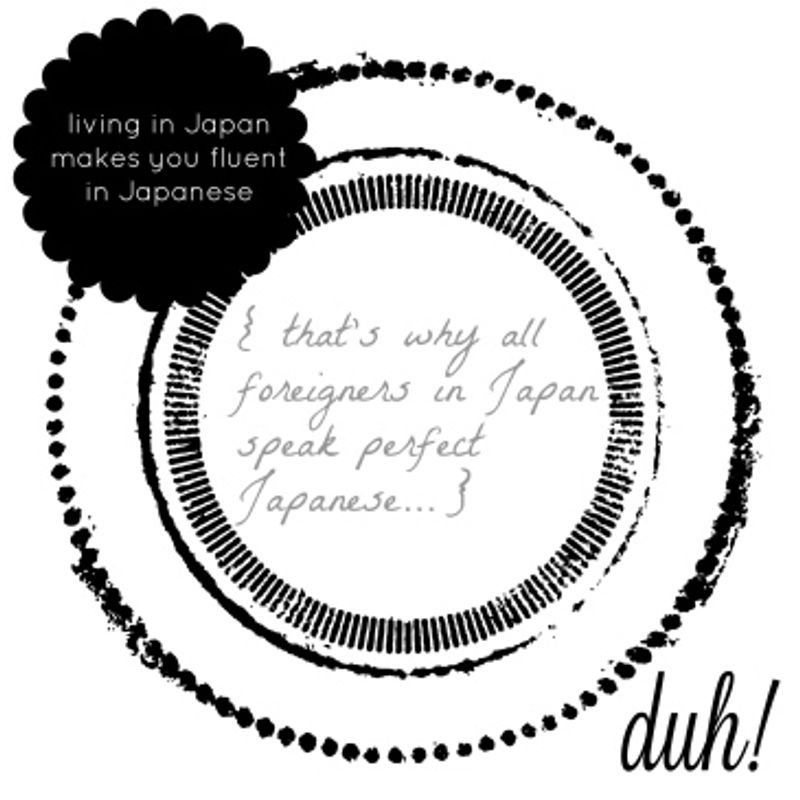Feb 24, 2017
Living In Japan Makes You Fluent In Japanese
What would I have like to have known before I arrived in Japan? Well...

There’s this crazy idea floating around – kind of like when you step in dog poop and the smell lingers with you all day… It’s that nasty. The idea is that living in Japan magically gives you fluency in Japanese. Sorry to burst your bubble (how is it in there with the rainbows and unicorns?), but no, it doesn’t. Shall I lecture you about why?
No expectations. Japanese people don’t expect you to speak Japanese. In fact, sometimes they are disappointed when you do! So, gestures and single words are enough to survive in daily life. Why study more? A quick look at my weekday routine; walk to the station, catch the train (buy my ticket at a machine), stop at the convenience store on the walk to work, teach all day in English, converse all day in English with my colleagues (as per the schools request to maintain an 'all English' teacher), walk to the station, catch the train (buy my ticket on the train because it's a small stop with no machine), stop by the supermarket on my walk home, arrive home to my fellow foreign husband with whom I speak English. Now not everyone will live like this, but how many times do I get to use Japanese in a day? I say good morning to my local convenience store staff and comment on the weather, buy my return train ticket from the conductor on the train, and say good evening and again comment on the weather to the supermarket staff. That's it. Each of these conversations can be avoided or completed with minimal Japanese. I have to really push myself to use Japanese even though I live in Japan. How do I learn anything? I spend my weekend with Japanese friends and talk as much as possible to them. But... On to my next issue...
Japanese people can speak English. Whether or not they ‘do’ is another story. But with the people who do want to talk to you, you may have to fight a battle of languages and wills to see which language emerges victorious. Basically, you have 30 seconds to wow them with your Japanese before they decide their English ability is higher and switch the conversation to English. Thus ensues your capitulation into the comfort of speaking English, or an awkward exchange between their English contribution and your stubborn insistence on using Japanese. Good luck…
Active listening takes work! Yes, you are surrounded by Japanese all day but it is too easy to tune it out. You actually have to train your brain to recognise Japanese speech as words, until you do that it is no more than background noise like birds or cars driving past.
Comfort of fellow foreigners. Because let’s face it, no one will understand your complaints, your humour, and oh boy your sarcasm like your foreign friends will. Try not to fall into the trap of the security and familiarity they offer. Put yourself out there and make some Japanese friends.
So if living in Japan doesn’t make me fluent in Japanese, then why in the world am I trying so hard to get there? Because living in Japan provides you with the best opportunity to become fluent. It is up to you to use that opportunity. Just like any other tool, if you don’t pick it up and use it, it won’t do anything for you by itself. Unfortunately this particular tool doesn’t come with a user manual.
If your goal in moving to Japan is to achieve fluency in Japanese, you may need to consider making a plan to get yourself actively learning and using Japanese. Here are a few strategies I find have helped me:
SHADOWING:
This method of study involves listening and repeating Japanese phrases after a recording. Whether it is single vocabulary words, basic greetings, or longer phrases and conversations, repeating after a recording of a native speaker can help increase your speaking speed, improve your listening skills, and also help you pick up on the nuances in tone and accent. You can begin shadowing before you come to Japan to be as prepared as possible to begin speaking when you arrive. I have used the 'Let's Speak Japanese' series and love it!

TV:
Don't underestimate the power of repetition. When you arrive in Japan, get a TV. There is a fee for owning a TV but aside from entertainment think of it as an investment in your studies too. Every day, listen to the same morning show and the same evening news program. You might surprise yourself with how soon you begin to understand greetings, the weather, locations, and other daily life vocabulary. Not to mention, you'll have conversation topics in common with your colleagues or students because you'll be watching the same TV shows they do.
LABELS:
Really. Label your house. Label your bathroom products, label your handbag contents, label your pantry contents, label everything. Before you come to Japan learn to read some basic products and items and it will make your daily life so much easier. Don't worry. there will be plenty of vocabulary words remaining for you to master when you get here.

Overall, you will have more exposure to Japanese being IN Japan than outside of it. But I think many people arrive with lofty expectations and are disappointed. How hard I'd need to push to live in Japanese is something I wish I'd known before I came to Japan.
{ Ashes }

There’s this crazy idea floating around – kind of like when you step in dog poop and the smell lingers with you all day… It’s that nasty. The idea is that living in Japan magically gives you fluency in Japanese. Sorry to burst your bubble (how is it in there with the rainbows and unicorns?), but no, it doesn’t. Shall I lecture you about why?
No expectations. Japanese people don’t expect you to speak Japanese. In fact, sometimes they are disappointed when you do! So, gestures and single words are enough to survive in daily life. Why study more? A quick look at my weekday routine; walk to the station, catch the train (buy my ticket at a machine), stop at the convenience store on the walk to work, teach all day in English, converse all day in English with my colleagues (as per the schools request to maintain an 'all English' teacher), walk to the station, catch the train (buy my ticket on the train because it's a small stop with no machine), stop by the supermarket on my walk home, arrive home to my fellow foreign husband with whom I speak English. Now not everyone will live like this, but how many times do I get to use Japanese in a day? I say good morning to my local convenience store staff and comment on the weather, buy my return train ticket from the conductor on the train, and say good evening and again comment on the weather to the supermarket staff. That's it. Each of these conversations can be avoided or completed with minimal Japanese. I have to really push myself to use Japanese even though I live in Japan. How do I learn anything? I spend my weekend with Japanese friends and talk as much as possible to them. But... On to my next issue...
Japanese people can speak English. Whether or not they ‘do’ is another story. But with the people who do want to talk to you, you may have to fight a battle of languages and wills to see which language emerges victorious. Basically, you have 30 seconds to wow them with your Japanese before they decide their English ability is higher and switch the conversation to English. Thus ensues your capitulation into the comfort of speaking English, or an awkward exchange between their English contribution and your stubborn insistence on using Japanese. Good luck…
Active listening takes work! Yes, you are surrounded by Japanese all day but it is too easy to tune it out. You actually have to train your brain to recognise Japanese speech as words, until you do that it is no more than background noise like birds or cars driving past.
Comfort of fellow foreigners. Because let’s face it, no one will understand your complaints, your humour, and oh boy your sarcasm like your foreign friends will. Try not to fall into the trap of the security and familiarity they offer. Put yourself out there and make some Japanese friends.
So if living in Japan doesn’t make me fluent in Japanese, then why in the world am I trying so hard to get there? Because living in Japan provides you with the best opportunity to become fluent. It is up to you to use that opportunity. Just like any other tool, if you don’t pick it up and use it, it won’t do anything for you by itself. Unfortunately this particular tool doesn’t come with a user manual.
If your goal in moving to Japan is to achieve fluency in Japanese, you may need to consider making a plan to get yourself actively learning and using Japanese. Here are a few strategies I find have helped me:
SHADOWING:
This method of study involves listening and repeating Japanese phrases after a recording. Whether it is single vocabulary words, basic greetings, or longer phrases and conversations, repeating after a recording of a native speaker can help increase your speaking speed, improve your listening skills, and also help you pick up on the nuances in tone and accent. You can begin shadowing before you come to Japan to be as prepared as possible to begin speaking when you arrive. I have used the 'Let's Speak Japanese' series and love it!

TV:
Don't underestimate the power of repetition. When you arrive in Japan, get a TV. There is a fee for owning a TV but aside from entertainment think of it as an investment in your studies too. Every day, listen to the same morning show and the same evening news program. You might surprise yourself with how soon you begin to understand greetings, the weather, locations, and other daily life vocabulary. Not to mention, you'll have conversation topics in common with your colleagues or students because you'll be watching the same TV shows they do.
LABELS:
Really. Label your house. Label your bathroom products, label your handbag contents, label your pantry contents, label everything. Before you come to Japan learn to read some basic products and items and it will make your daily life so much easier. Don't worry. there will be plenty of vocabulary words remaining for you to master when you get here.

Overall, you will have more exposure to Japanese being IN Japan than outside of it. But I think many people arrive with lofty expectations and are disappointed. How hard I'd need to push to live in Japanese is something I wish I'd known before I came to Japan.
{ Ashes }



0 Comments